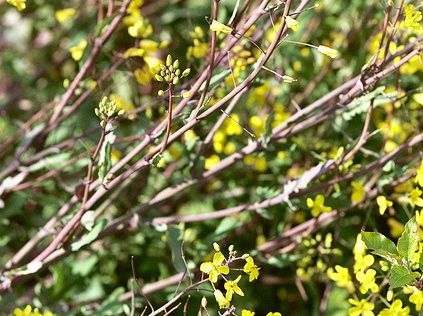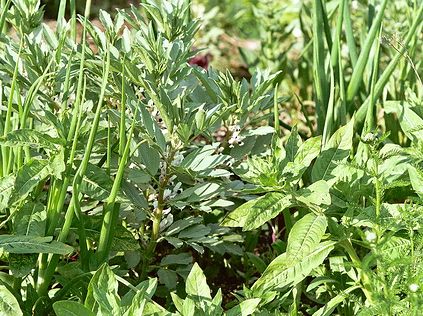
reference-image, l
(post, Jessica Sherifdeen)
Gardening is not easy for someone socialized in our instant-gratification culture. For many years, I resisted growing vegetables and fruits for much this reason, laughingly explaining I couldn't possibly wait a few months to harvest peas or beans, let alone the years required for asparagus, or grapes, or cherries. "Besides, I have a black thumb," I'd say, describing how I'd killed a houseplant in college by watering it with Sprite. (It looked thirsty, and I didn't want to get up.) And then came the second trimester of my third pregnancy, when I learned the true meaning of "nesting instinct." I still theorize that nesting gets stronger in every pregnancy. If I have another baby, I'm sure I'll be adding on to the house for his room, and doing the framing myself. In any case, the garden benefited greatly from my hormones, and it has been growing. And this winter we finally cooped up the hens, freeing tender brassicas and lettuces from their ravages and allowing me to finally plot a real carrot bed. We've just dug up the lawn and the landscape seems to change every day, excited about its transformation to urban farmland. [%image reference-image float=right width=400 caption="Kale raab in the garden."] In the almost two years of my third baby's life, I have proven myself admirably able to delay gratification (and keep plants alive, sans soda). There is the asparagus bed, which I planted from seed last spring and inspected daily this year for tiny purple spears, cheering and showering love on every shoot, holding myself back from all but the tiniest nibble, I'll wait 'til next year like a good urban farmer. There are the three grape vines, finally fruiting this year, the tiniest little green buds that will be purple and greenly plump by September. The chives and sage and lavender and thyme and oregano and marjoram and parsley, it's all rioting. I can harvest daily without slowing it down. But I want more. After two years, it seems that the months of April and May should allow me to harvest at least a daily salad or side dish from my garden. One chard, one collard, one kale, and one broccoli raab are all that survived the winter, though, and they're not exactly sufficient to feed several lovers of all things green. And as I ride my bike around the city, the neglected garden boxes in front yards and parking strips, the well-tended back-yard rows, the raised beds in permaculture plots, their kales wave their four-foot-high flowering heads at me, mocking. "We're huge!" they say. "A real gardener lives here." There is a garden near my six-year-old's school, on the corner of a four-way stop, that's the worst of all of them. It's flat in all directions, and from at least a few blocks away, I can see the sunflowers, proud totems of the edible landscape. Last fall sometime, I started wondering if the house had changed owners; the sunflowers were never beheaded and, as spring grew, the kale and arugula, sketched in exuberant rows, began to flower. I passed by at least a few times a week, and itched to transplant — figuratively or literally, either one — some of its riches to my front yard. Who had done such loving work and then let that delicious greenery go untasted? One day I gathered my courage and went to knock on the door to ask about that kale. I waited anxiously, rehearsing my request in my head and trying not to peer too curiously in the windows. Although there was a van parked out front, no one came to the door. I couldn't get the garden out of my head. A few days later, I rode my bike slowly up to the house, thinking I'd roll onto the sidewalk and just peer again into the riches, perhaps snag just a stem, a blossom. But hello: two young men, with ladders and paint cans, were working on the house at the edge of the garden. I went up to them excitedly and asked, were they the owners, did they know about the garden, I really like raab, could I possibly harvest a little? "Sure — as long as you don't take it all!" one of them said. I surveyed the garden, at least six or seven dozen plants, all gone riotously to seed. No, I wouldn't take it all. As I stepped cautiously through the garden, the more curly-headed of the two men came with me, told me that the owner of the house had been married, gotten pregnant, and left her home to live with the new husband. There would be a renter in a few weeks, but would they know what to do with this raab? No. [%image onions float=right width=400 caption="Onions and fava beans waiting to be harvested."] We explored the garden, me showing him the difference in taste between the arugula and mustard raab (I hadn't noticed the mustard, it was the most tender and surprising, delicious), finding Italian onions, whole cloves of garlic that had sprouted again, in place, him telling me of a time last summer when she had pulled fava-bean stalks out and roasted them over a fire, whole. They'd eaten them out of the shell. I looked around the garden and began to notice favas planted everywhere, at the end of every obelisk-shaped row of plants, blooming with their lovely bicolored blossoms. There would be so many favas! I pulled a carrot, too. Purple haze — the kind I've just planted in my garden. He ate it, pronouncing it sweet. And told me I could come back and harvest anytime. Tonight, I did so again. The men had moved inside to paint, but waved cheerfully as I took my four-year-old through the garden, handing him bits of mustard and collard greens as I pulled a few onions and thinned the garlic. There was no way of knowing I'd even been there but for a boot print now and again. The abundance was laughing at me, big gulps of happy flowering plants. I checked the enormous stand of rhubarb — not quite ripe enough — and admired the gardener's skill. I wanted to take it with me, not just the arugula and kale and collard and mustard raab, but also some of her mastery, her planning, her way of tucking garlic between collards and raspberries, her obvious hunger for good food at her kitchen door. And I hatched a plan to write down the address and send her a baby gift, a note of thanks, and a promise, that I will stop in when I pass the new tenant in the garden. I will show whomever I see there what is a weed and what is delicious, what should be pulled and what should be savored. I will tell him, no, you don't have a black thumb, just stay away from the Sprite. Perhaps if I never see anyone, I will get up the nerve to knock, again, and take a few minutes to explore the vegetable garden of a true edible artist. And I'd really like to pick a few of those favas.

reference-image, l

onions, l